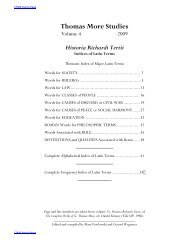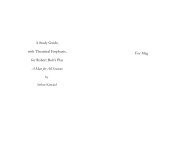life of john picus earl of mirandola - The Center for Thomas More ...
life of john picus earl of mirandola - The Center for Thomas More ...
life of john picus earl of mirandola - The Center for Thomas More ...
Create successful ePaper yourself
Turn your PDF publications into a flip-book with our unique Google optimized e-Paper software.
Detestation <strong>of</strong> vicious<br />
<strong>life</strong> passed<br />
No divine either old<br />
or new to J. Picus<br />
unknown<br />
[61]<br />
J. Picus loth to dispute<br />
12 <strong>Thomas</strong> <strong>More</strong>’s Life <strong>of</strong> John Picus<br />
delicious pleasure. To the fastening <strong>of</strong> good discipline in the minds<br />
<strong>of</strong> the hearers, those things seem to be <strong>of</strong> great effect which be both<br />
<strong>of</strong> their own nature good and also be spoken <strong>of</strong> such a master as is<br />
converted to the way <strong>of</strong> justice from the crooked and ragged path <strong>of</strong><br />
voluptuous living.<br />
⌐ <strong>The</strong> Burning <strong>of</strong> Wanton Books. ¬ Five books that in his youth <strong>of</strong><br />
wanton verses <strong>of</strong> love with other like fantasies he had made in his vulgar<br />
tongue altogether ⌐ (in detestation <strong>of</strong> his vice passed and lest these<br />
trifles might be some evil occasion afterwards) ¬ he burned.<br />
⌐ Of his Study and Diligence in Holy Scripture. ¬ From thence<strong>for</strong>th he<br />
gave himself day and night most fervently to the studies <strong>of</strong> Scripture,¦<br />
⌐ in which he wrote many noble books which well testify both his<br />
angelic wit, his ardent labour, and his pr<strong>of</strong>ound erudition, <strong>of</strong> which<br />
books some we have and some (as an inestimable treasure) we have<br />
lost. Great libraries–it is incredible to consider with how marvellous<br />
celerity he read them over and wrote out what him° liked. Of the old<br />
Fathers <strong>of</strong> the Church so great knowledge he had, as it were hard <strong>for</strong><br />
him to have that hath lived long and all his <strong>life</strong> hath done nothing else<br />
but read them. Of these newer divines so good judgment he had, it<br />
might appear there were nothing in any <strong>of</strong> them that were unknown to<br />
him, but all things as ripe as though he had all their works ever be<strong>for</strong>e<br />
his eyes. But <strong>of</strong> all these new doctors he specially commendeth Saint<br />
<strong>Thomas</strong>, 1 as him that en<strong>for</strong>ceth himself in a sure pillar <strong>of</strong> truth. ¬ He<br />
was very quick, wise, and subtle in disputations and had great felicity<br />
therein, while he had that high stomach. 2 ¦ But now a great while he<br />
had bid such conflicts farewell and every day more and more hated<br />
them and so greatly abhorred them that, when Hercules Estensis, 3 Duke<br />
<strong>of</strong> Ferrara, first by messengers and after by himself, desired him to<br />
dispute at Ferrara, because the General Chapter <strong>of</strong> Friars Preachers°<br />
16 him he / 29 Friars Preachers Dominicans<br />
¦ 11 Scripture At this point <strong>More</strong> omits several pages <strong>of</strong> the Latin original, amounting to n<strong>earl</strong>y<br />
a third <strong>of</strong> the entire work (summarized by <strong>More</strong> in the following lines, 12.10-21). <strong>The</strong> omitted<br />
passage deals mainly with Picus’ philosophical and theological writings. For an extended treatment<br />
<strong>of</strong> the omission, see Lehmberg 71-72. / 25 <strong>More</strong> omits a Latin passage in which Picus’<br />
intellectual powers are compared with those <strong>of</strong> renowned scholastic figures, such as Albertus<br />
Magnus, <strong>Thomas</strong> Aquinas, and Duns Scotus.<br />
1. Picus’ library contained n<strong>earl</strong>y thirty works or editions <strong>of</strong> St. <strong>Thomas</strong> Aquinas (see Kibre 70).<br />
2. He…stomach: <strong>More</strong> thus translates an isolated sentence in the Latin: Disceptandi porro peritissimus<br />
fuit frequentemque & impensissimam operam litterariis agonibus, dum ferveret animus, impendit. “<strong>The</strong>n,<br />
too, he was very skilled in disputation, and while his temperament was still fiery he expended an<br />
enormous amount <strong>of</strong> ef<strong>for</strong>t in scholarly contests” (CW 1:316, 317).<br />
3. Hercules Estensis: Ercole d’Este (1431?–1505), who became duke <strong>of</strong> Ferrara in 1471.<br />
5<br />
10<br />
15<br />
20<br />
25











